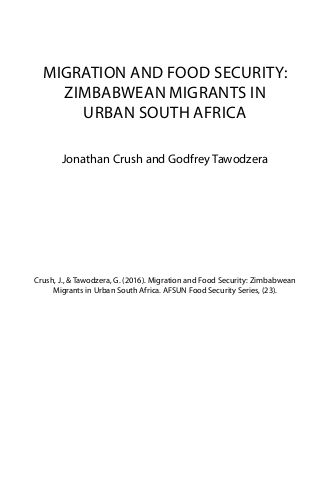Urban Food Security Series | #23

This report focuses on people involved in South-South migration, in this case Zimbabweans in South African urban areas. It therefore addresses a major neglected topic in the emerging literature on migration and food security.
Key questions that need research include the following: What strategies do migrants adopt in countries of destination to earn income and what proportion of their income is spent on food? Do migrants experience greater food insecurity than the local population in each of the various standard categories of food security – food availability, food accessibility, food quality, and food regularity? Are migrants more or less vulnerable to undernutrition and overnutrition than non-migrants? Does the quality of their diet change after migration? Where do migrants tend to source their foods, what foods do they con- sume and with what consequences for their well-being?
This study of Zimbabwean migrants in South Africa set out to answer the general questions outlined above as well as some more specific issues including: What are the levels of household food insecurity among migrants in general and Zimbabwean migrants in particular in South African cities? What are the major causes of household food insecurity? What are the general experiences of food insecurity among different types of migrant household? And what responses and strategies are adopted to deal with food insecurity within the household?
Links
Resource collections
- UN Habitat - Urban Response Collection
- Urban Response - Urban Crisis Preparedness and Risk Reduction
- Urban Response Collection - Community Engagement and Social Cohesion
- Urban Response Collection - Economic Recovery
- Urban Response Collection - Environment and Climate Change
- Urban Response Collection - Housing, Land and Property
- Urban Response Collection - Urban Crisis Response, Recovery and Reconstruction
- Urban Response Collection - Urban Resilience